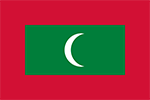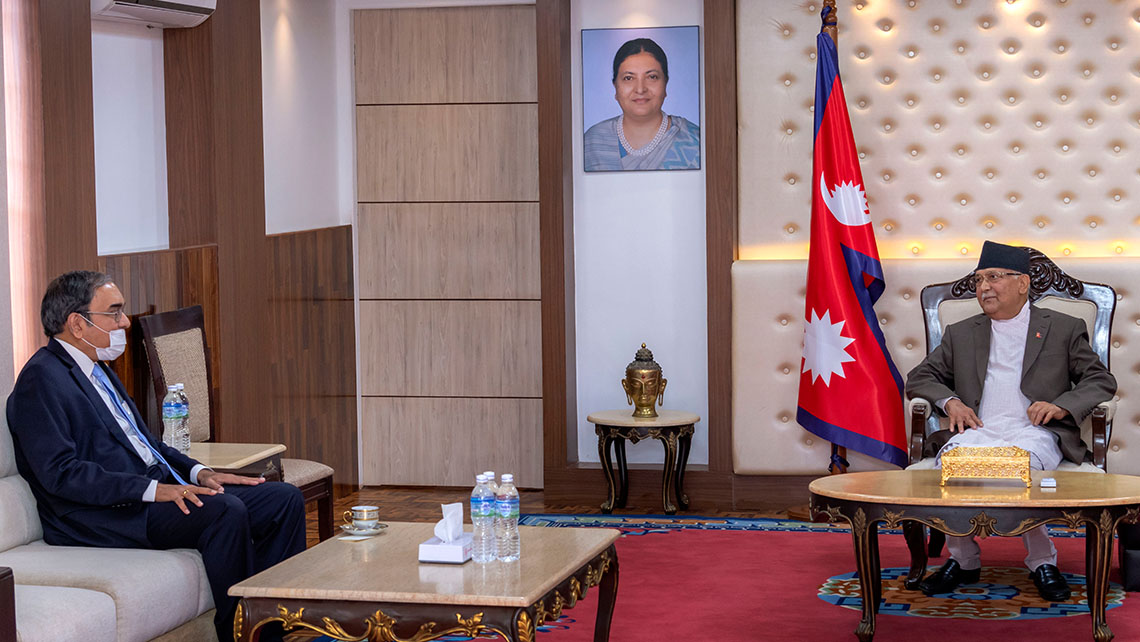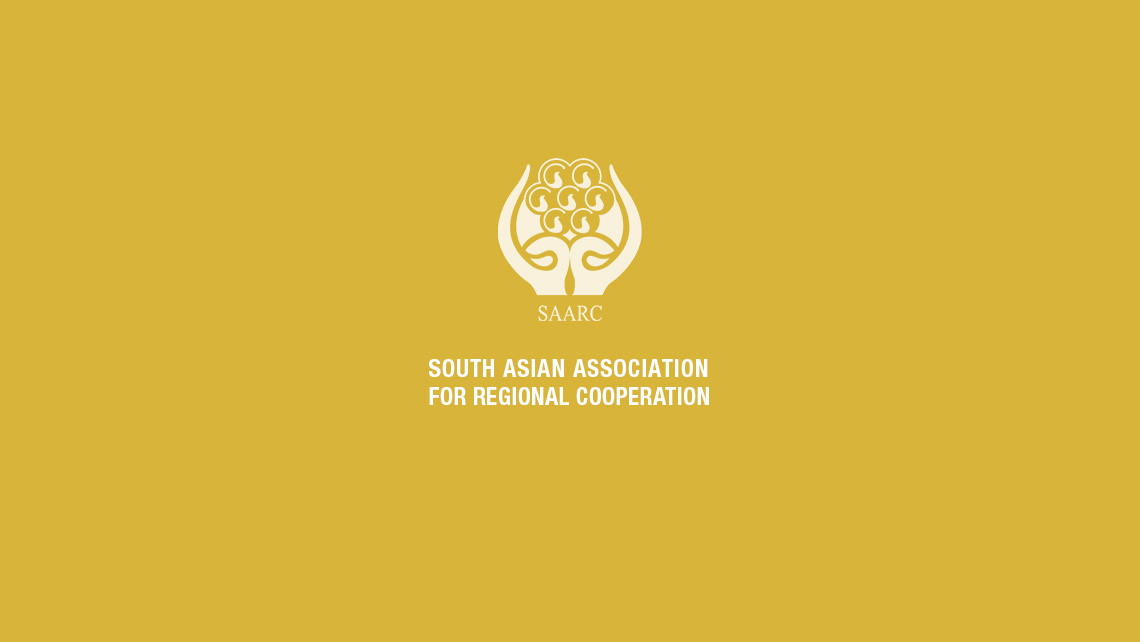H. E. Mr. Esala Ruwan Weerakoon, Secretary General of the South Asian Association for Regional Cooperation (SAARC), paid an introductory courtesy call on the Rt. Hon. Mr. KP Sharma Oli, Prime Minister of Nepal, today at his residence in Baluwatar, Kathmandu.
The Prime Minister felicitated the Secretary General on his appointment as the fourteenth Secretary General of SAARC. The Prime Minister expressed confidence that with his vast diplomatic experience in and knowledge about South Asia, the Secretary General would be able to make a tremendous contribution to further strengthen the SAARC process. The Prime Minister assured him of full support of the Government of Nepal in fulfilling his mandate as the Secretary General.
The Secretary General expressed his gratitude to the Government of Nepal for endorsing his nomination as the Secretary General of SAARC. While appreciating the valuable support given to the SAARC Secretariat by the Government of Nepal, the Secretary General expressed the hope that the Government of Nepal would also lend similar support and guidance to him in the accomplishment of his responsibility as the Secretary General.
The Prime Minister underlined the urgency of early convening of the Nineteenth SAARC Summit and stated that Nepal, as the current Chair of SAARC, has been making continuous efforts and consultations with other Member States to create a conducive environment for the next Summit. The Prime Minister underscored the importance and relevance of SAARC to achieve common development aspirations such as SDGs as well as to deal with common challenges like COVID-19 Pandemic and poverty in the region. While referring to the SAARC Leaders’ Video Conference to combat COVID-19 Pandemic, the Prime Minister stressed the need to revitalize and further strengthen the SAARC process to promote the welfare and quality of life of the people in the region.
The Secretary General briefed the Prime Minister about the recent activities of the SAARC Secretariat including those on the fight against COVID-19 Pandemic.
H. E. Mr. Esala Ruwan Weerakoon, Secretary General of the South Asian Association for Regional Cooperation (SAARC), paid an introductory courtesy call on the Rt. Hon. Mr. KP Sharma Oli, Prime Minister of Nepal, today at his residence in Baluwatar, Kathmandu.
The Prime Minister felicitated the Secretary General on his appointment as the fourteenth Secretary General of SAARC. The Prime Minister expressed confidence that with his vast diplomatic experience in and knowledge about South Asia, the Secretary General would be able to make a tremendous contribution to further strengthen the SAARC process. The Prime Minister assured him of full support of the Government of Nepal in fulfilling his mandate as the Secretary General.
The Secretary General expressed his gratitude to the Government of Nepal for endorsing his nomination as the Secretary General of SAARC. While appreciating the valuable support given to the SAARC Secretariat by the Government of Nepal, the Secretary General expressed the hope that the Government of Nepal would also lend similar support and guidance to him in the accomplishment of his responsibility as the Secretary General.
The Prime Minister underlined the urgency of early convening of the Nineteenth SAARC Summit and stated that Nepal, as the current Chair of SAARC, has been making continuous efforts and consultations with other Member States to create a conducive environment for the next Summit. The Prime Minister underscored the importance and relevance of SAARC to achieve common development aspirations such as SDGs as well as to deal with common challenges like COVID-19 Pandemic and poverty in the region. While referring to the SAARC Leaders’ Video Conference to combat COVID-19 Pandemic, the Prime Minister stressed the need to revitalize and further strengthen the SAARC process to promote the welfare and quality of life of the people in the region.
The Secretary General briefed the Prime Minister about the recent activities of the SAARC Secretariat including those on the fight against COVID-19 Pandemic.
H. E. Mr. Esala Ruwan Weerakoon, Secretary General of the South Asian Association for Regional Cooperation (SAARC), paid an introductory courtesy call on the Rt. Hon. Mr. KP Sharma Oli, Prime Minister of Nepal, today at his residence in Baluwatar, Kathmandu.
The Prime Minister felicitated the Secretary General on his appointment as the fourteenth Secretary General of SAARC. The Prime Minister expressed confidence that with his vast diplomatic experience in and knowledge about South Asia, the Secretary General would be able to make a tremendous contribution to further strengthen the SAARC process. The Prime Minister assured him of full support of the Government of Nepal in fulfilling his mandate as the Secretary General.
The Secretary General expressed his gratitude to the Government of Nepal for endorsing his nomination as the Secretary General of SAARC. While appreciating the valuable support given to the SAARC Secretariat by the Government of Nepal, the Secretary General expressed the hope that the Government of Nepal would also lend similar support and guidance to him in the accomplishment of his responsibility as the Secretary General.
The Prime Minister underlined the urgency of early convening of the Nineteenth SAARC Summit and stated that Nepal, as the current Chair of SAARC, has been making continuous efforts and consultations with other Member States to create a conducive environment for the next Summit. The Prime Minister underscored the importance and relevance of SAARC to achieve common development aspirations such as SDGs as well as to deal with common challenges like COVID-19 Pandemic and poverty in the region. While referring to the SAARC Leaders’ Video Conference to combat COVID-19 Pandemic, the Prime Minister stressed the need to revitalize and further strengthen the SAARC process to promote the welfare and quality of life of the people in the region.
The Secretary General briefed the Prime Minister about the recent activities of the SAARC Secretariat including those on the fight against COVID-19 Pandemic.
H. E. Mr. Esala Ruwan Weerakoon, Secretary General of the South Asian Association for Regional Cooperation (SAARC), paid an introductory courtesy call on the Rt. Hon. Mr. KP Sharma Oli, Prime Minister of Nepal, today at his residence in Baluwatar, Kathmandu.
The Prime Minister felicitated the Secretary General on his appointment as the fourteenth Secretary General of SAARC. The Prime Minister expressed confidence that with his vast diplomatic experience in and knowledge about South Asia, the Secretary General would be able to make a tremendous contribution to further strengthen the SAARC process. The Prime Minister assured him of full support of the Government of Nepal in fulfilling his mandate as the Secretary General.
The Secretary General expressed his gratitude to the Government of Nepal for endorsing his nomination as the Secretary General of SAARC. While appreciating the valuable support given to the SAARC Secretariat by the Government of Nepal, the Secretary General expressed the hope that the Government of Nepal would also lend similar support and guidance to him in the accomplishment of his responsibility as the Secretary General.
The Prime Minister underlined the urgency of early convening of the Nineteenth SAARC Summit and stated that Nepal, as the current Chair of SAARC, has been making continuous efforts and consultations with other Member States to create a conducive environment for the next Summit. The Prime Minister underscored the importance and relevance of SAARC to achieve common development aspirations such as SDGs as well as to deal with common challenges like COVID-19 Pandemic and poverty in the region. While referring to the SAARC Leaders’ Video Conference to combat COVID-19 Pandemic, the Prime Minister stressed the need to revitalize and further strengthen the SAARC process to promote the welfare and quality of life of the people in the region.
The Secretary General briefed the Prime Minister about the recent activities of the SAARC Secretariat including those on the fight against COVID-19 Pandemic.
- Press Release - Secretary General of SAARC calls on the Rt. Hon. Prime Minister of Nepal
- Press Release- SAARC Health Ministers’ Video Conference to address the COVID-19 pandemic, 23 April 2020
- The Leaders of the Member States of SAARC held a Video Conference to discuss measures to contain the spread of COVID-19 in the region
- Press Release - Secretary General of SAARC calls on the Hon. Foreign Minister of Nepal











